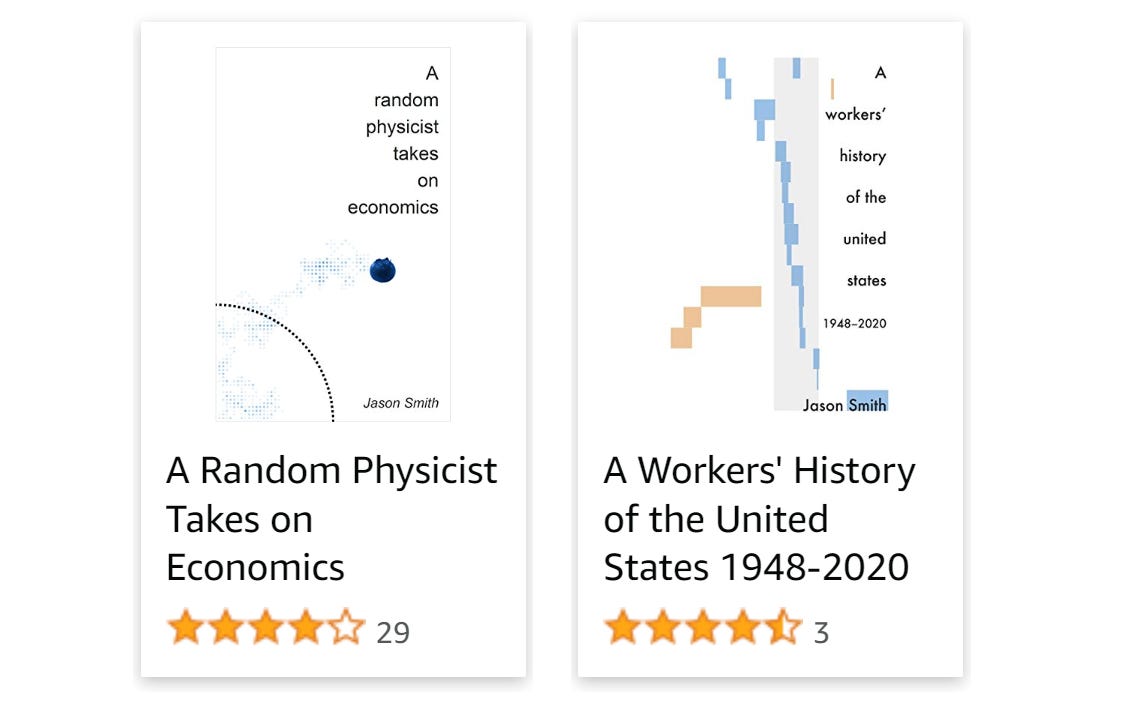My eBooks are free this weekend
A Random Physicist (2017) and A Workers' History (2019) are free July 22nd and July 23rd
Inspired by a twitter exchange on growth in the post war period, I decided to make my eBooks free this weekend. Links in the titles:
A Random Physicist Takes On Economics (2017)
A Random Physicist Takes on Economics is a novella-length critique of economic methodology from an outsider's perspective as well as a proposal for a new way of understanding supply and demand and rational agents as emergent concepts from the complex behavior of real people. After a brief biographical introduction on how he ended up doing economic research, author, blogger and physicist Jason Smith leverages “irrational” random agents and information theory to argue against the modern understanding of ubiquitous economic constructs such as so-called “rational” expectations, prediction markets, and utility maximizing agents using examples consisting of nothing more complicated than Dungeons and Dragons dice sets and pints of blueberries. Sometimes the unrealistic assumptions frequently made by economists about human rationality are found to be unnecessary to produce the same standard economic results. Sometimes “irrational” agents give insight as to why standard economic results fail. In the end, Dr. Smith calls for economists to present more uncertainty and plead greater ignorance when it comes to questions of politics and policy, and for everyone to move beyond zero-sum economic thinking and towards embracing the diversity and complexity of economic systems.
A Workers’ History of the United States 1948-2020 (2019)
After seven years of economic research and developing forecasting models that have outperformed the experts, author, blogger, and physicist Dr. Jason Smith offers his controversial insights about the major driving factors behind the economy derived from the data and it's not economics — it's social changes. These social changes are behind the questions of who gets to work, how those workers organize, and how workers identify politically — and it is through labor markets that these social changes manifest in economic effects. What would otherwise be a disjoint and nonsensical postwar economic history of the United States is made into a cohesive workers' history driven by women entering the workforce and the backlash to the Civil Rights movement — plainly: sexism and racism. This new understanding of historical economic data offers lessons for understanding the political economy of today and insights for policies that might actually work.
As elaborated on in the last chapter of A Random Physicist, information equilibrium is something of a scientific proof of the benefits of diversity, equity, and inclusion. Coupled with the arguments in A Workers’ History, the modern right wing agenda is basically anathema to economic growth and productivity.
Another short summary of the two books (elaborated on here) is that A Random Physicist is about uninstalling Hayek and A Workers’ History is about uninstalling Friedman.





For more debunking Friedman, the author of <i>Free to Choose</i>, I recommend his student, Elton Rayack's <i>Not So Free To Choose</i>.